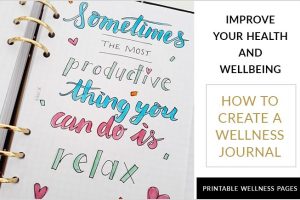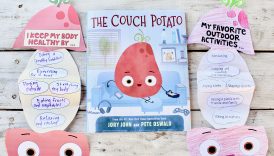The Daily Wellness Ritual: How Journaling Can Improve Your Health

Importance of Daily Wellness Rituals
Establishing daily wellness rituals can significantly improve overall well-being and set a positive tone for the day. These practices not only nurture the body and mind but also help individuals connect more deeply with their inner selves. For instance, someone might begin their day with a short meditation, followed by a nourishing breakfast, creating a sense of calm and readiness for whatever lies ahead. Consider incorporating the following daily wellness rituals:
- The Daily Wellness Ritual: How Journaling Can Improve Your Health
- Importance of Daily Wellness Rituals
- Journaling for Mental Health
- Benefits of Journaling
- Journaling for Physical Health
- Impact on Stress Levels
- Setting Up a Journaling Routine
- Prompts and Exercises for Journaling
- Gratitude Journaling
- Reflective Journaling
- Tracking Health Goals through Journaling
- Journaling Before Bed
- Creating a Positive Mindset Through Journaling
- Enhancing Emotional Intelligence Through Journaling
- XII. Digital Journaling Tools
- XIII. Journaling for Self-Discovery
- XIV. Conclusion & Recap
- Mindfulness Meditation: Spend at least 10 minutes in silence, focusing on your breath.
- Physical Activity: Engage in yoga, a brisk walk, or any preferred workout.
- Nourishing Meal Prep: Prepare meals that fuel your body with essential nutrients.
By committing to these rituals, individuals can cultivate resilience and emotional balance in their lives.
Journaling for Mental Health
Benefits of Journaling
Journaling serves as a powerful tool for enhancing mental health, providing an accessible outlet for thoughts and emotions. By regularly writing down feelings and experiences, individuals can achieve clarity and begin processing their thoughts in a structured way. For instance, a friend of mine started journaling after feeling overwhelmed by work stress; she found that just a few minutes each night helped her reflect and release pent-up emotions. Some key benefits of journaling include:
- Emotional Clarity: Helps unravel complex emotions and identify triggers.
- Stress Reduction: Encourages a healthier way to manage anxiety and overwhelming feelings.
- Self-Reflection: Promotes personal growth and self-awareness.
With these benefits, journaling can become an invaluable part of anyone’s mental wellness toolkit.
Journaling for Physical Health
Impact on Stress Levels
As we transition from the mental benefits, it’s crucial to note that journaling also plays a significant role in improving physical health, particularly through stress management. Elevated stress levels can lead to various health issues, from headaches to digestive problems. By keeping a journal, individuals can actively address and reduce their stress. Consider the following ways journaling can impact stress levels:
- Identifying Stressors: Writing about daily experiences helps pinpoint sources of anxiety.
- Coping Strategies: Journals can track what techniques work best for stress relief, like deep breathing or exercise.
- Physical Health Monitoring: Recording physical symptoms linked to stress can promote proactive health management.
A personal friend found that by journaling about her daily stress, she could see patterns and make lifestyle changes that significantly improved her overall health. Such reflections can transform how one approaches both mental and physical well-being.
Setting Up a Journaling Routine
Having explored the profound impact of journaling on mental and physical health, it’s time to dive into how to establish an effective journaling routine. Creating consistency in this practice ensures that individuals reap the benefits fully. To set up a journaling routine that works for you, consider these steps:
- Choose a Time: Find a moment in your day when you’re least distracted—perhaps early mornings or evenings.
- Designate a Space: Create a specific spot that feels comfortable and inviting for your journaling sessions.
- Keep it Simple: Start with just a few minutes initially and gradually increase the time as you grow more comfortable with the practice.
A friend of mine found that journaling right before bed helped her unload thoughts, leading to sweeter dreams and improved sleep. This structured yet flexible approach can truly enhance one’s journaling experience.
Prompts and Exercises for Journaling
Now that a journaling routine is established, the next step is to incorporate prompts and exercises to keep the practice engaging and purposeful. These prompts can help overcome writer’s block and inspire deeper reflection. Here are a few effective journaling prompts to consider:
- Daily Highlights: What were the top three moments of your day?
- Emotional Check-In: How are you feeling right now, and what is causing that emotion?
- Future Aspirations: Write about what you hope to achieve in the next year.
A colleague of mine uses thematic prompts each week; one week, she focuses on gratitude, while another is about personal challenges. This approach not only maintains her interest but also cultivates diverse insights that enhance her emotional understanding.
Gratitude Journaling
Building on the idea of prompts and exercises, gratitude journaling is a transformative practice that can significantly enhance overall well-being. By intentionally recognizing and recording the positive aspects of life, individuals can cultivate a mindset focused on appreciation rather than negativity. To start a gratitude journal, consider these tips:
- Daily Entries: Each day, write down three things you’re grateful for, no matter how small.
- Reflective Moments: At the end of the week, re-read your entries to see how gratitude influenced your overall mood.
- Special Occasions: Use your journal to express gratitude on special occasions or after significant events.
A friend of mine began this practice and noticed that, over time, her outlook shifted dramatically. It’s wonderful how acknowledging the good can foster resilience and joy amid life’s challenges.
Reflective Journaling
Expanding on the theme of gratitude, reflective journaling is another powerful method to achieve deeper self-awareness and personal growth. This practice encourages individuals to thoughtfully examine past experiences, decisions, and emotions to foster understanding and insight. To get started with reflective journaling, try these strategies:
- Event Analysis: Write about a specific event, noting what happened and how it made you feel.
- Lessons Learned: After reflecting, identify key lessons that can guide your future decisions.
- Goal Reviews: Regularly check in on your goals and reflect on your progress and obstacles.
A personal friend of mine began using reflective journaling after a challenging project at work. By unpacking her frustrations and insights, she not only learned from the experience but also felt more empowered in her career. This thoughtful reflection can pave the way for meaningful change in one’s life.
Tracking Health Goals through Journaling
Following the theme of reflective journaling, tracking health goals through journaling adds a proactive dimension to personal development. This method not only helps individuals stay accountable but also celebrates progress, no matter how small. By documenting health-related goals, individuals can identify patterns and adjust their approach as needed. Here are some effective strategies to track health goals:
- Daily Logs: Record your meals, exercise, and water intake to monitor your habits.
- Weekly Reviews: Summarize your week, celebrating achievements and identifying any challenges faced.
- Visual Progress: Use charts or bullet points to visually depict your advancements over time.
A colleague of mine started tracking her fitness goals through journaling. Not only did she notice physical improvements, but she also experienced increased motivation when reviewing her progress week by week. This practice can transform how one approaches health and wellness journeys.
Journaling Before Bed
Building on the practice of tracking health goals, journaling before bed can be a calming ritual that enhances relaxation and promotes restful sleep. This time allows individuals to reflect on the day’s events and release any lingering thoughts, making it easier to unwind. To create an effective bedtime journaling routine, consider these tips:
- Set a Regular Time: Choose a specific time each night to journal, signaling to your brain that it’s time to wind down.
- Reflect on the Day: Write about what went well and what could be improved, fostering a sense of closure.
- Gratitude Entries: End with at least one thing you’re grateful for to cultivate positivity before sleep.
A personal experience illustrates this beautifully—after starting a before-bed journaling routine, I discovered that my sleep quality improved noticeably. The mental clarity I gained allowed for more peaceful nights and refreshed mornings. This simple practice can significantly enhance well-being and mindfulness.
Creating a Positive Mindset Through Journaling
Continuing from the calming practice of journaling before bed, creating a positive mindset through journaling can be a transformative experience. By consistently recording uplifting thoughts and affirmations, individuals can shift their focus from negativity to optimism. Here are some strategies to foster a positive mindset through your journal:
- Affirmation Lists: Write down positive affirmations that resonate with you and review them daily.
- Success Journals: Document your achievements, big and small, to remind yourself of your capabilities.
- Mindfulness Exercises: Include entries that reflect on moments of joy or gratitude throughout the day.
A friend recently shared how her positive mindset has flourished since she adopted this journaling approach. By focusing on her successes and practicing affirmations, she feels more uplifted and motivated in her daily life. Journaling can truly be a beacon of positivity in challenging times.
Enhancing Emotional Intelligence Through Journaling
Building upon the concept of creating a positive mindset, journaling can significantly enhance emotional intelligence (EI) by encouraging introspection and emotional awareness. This self-reflective practice allows individuals to better understand their emotions, reactions, and interpersonal dynamics. To use journaling effectively for boosting emotional intelligence, consider these approaches:
- Emotion Log: Keep a daily log of your emotions, noting triggers and responses.
- Perspective-Taking: Write about challenging interactions from the other person’s viewpoint to foster empathy.
- Self-Reflection: After intense emotional experiences, analyze what you felt and why.
For example, a close friend realized that journaling about her feelings helped her navigate conflict more effectively, leading to improved relationships. By enhancing EI through journaling, individuals cultivate healthier connections and a deeper understanding of themselves and others.
XII. Digital Journaling Tools
As we transition from enhancing emotional intelligence, it’s important to recognize the role of technology in facilitating journaling practices. Digital journaling tools can make the process more efficient and accessible, providing various features that traditional journaling may lack. Consider these popular digital journaling tools to enhance your practice:
- Evernote: Great for organizing thoughts and adding multimedia elements like images and voice notes.
- Day One: Offers a visually appealing interface with prompts and the option to add photos to entries.
- Journey: A cross-platform journal that integrates seamlessly with Google Drive for easy access.
I personally use a digital journaling app that allows me to log entries anytime, anywhere. This convenience has made journaling a consistent part of my routine, ensuring I maintain emotional and mental clarity. Embracing digital tools can truly elevate the journaling experience!
XIII. Journaling for Self-Discovery
Following our exploration of digital journaling tools, it’s essential to highlight how journaling can serve as a profound vehicle for self-discovery. This reflective practice provides a safe space for deep introspection, allowing individuals to explore their beliefs, values, and desires. To maximize self-discovery through journaling, try:
- Free Writing: Set a timer for 10 minutes and write without stopping. Let your thoughts flow naturally.
- Values Assessment: Reflect on what truly matters to you and write down your core values.
- Life Timeline: Create a timeline of significant life events and explore how they shaped your identity.
A friend once shared how free writing led her to uncover hidden passions she hadn’t acknowledged before. Such insights can be incredibly empowering, guiding individuals toward a more authentic and fulfilling life. Journaling, therefore, becomes not just a habit but a transformative journey of self-exploration.
XIV. Conclusion & Recap
As we conclude our journey through the many facets of journaling, it’s clear that this practice offers a wealth of benefits for emotional, mental, and physical health. From enhancing emotional intelligence and fostering a positive mindset to promoting self-discovery, journaling can be tailored to fit personal needs and goals. To recap the key points:
- Daily Wellness Rituals: Establishing a routine bolsters overall well-being.
- Mental and Physical Health: Journaling enhances clarity, reduces stress, and tracks health goals.
- Variety in Practice: Utilizing prompts, gratitude practices, and digital tools amplifies engagement.
Through my own experience, journaling has been a transformative tool, leading to greater understanding and connection with myself. Embrace this powerful practice to unlock your potential and navigate life’s challenges with resilience and insight.





